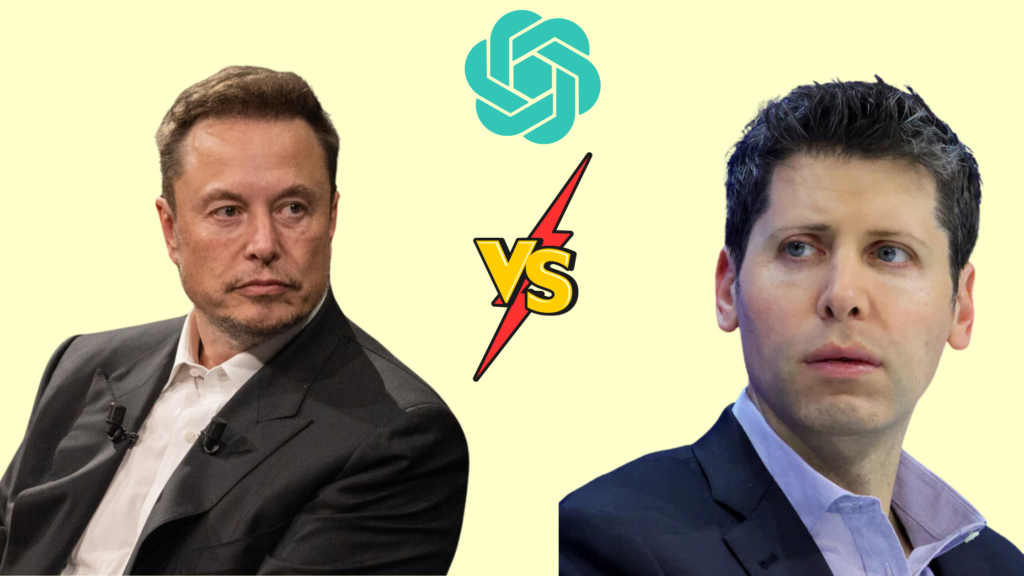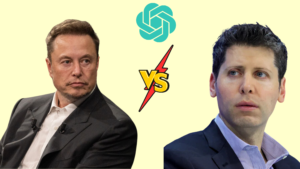Renowned entrepreneur and co-founder of OpenAI, Elon Musk, has initiated legal action against the organization and its CEO, Sam Altman, citing a deviation from their original mission of serving humanity’s best interests.
In a lawsuit filed in San Francisco, Musk alleges that OpenAI, known for its advancements in artificial intelligence such as ChatGPT, has shifted its focus towards profit, particularly after forging a partnership with tech giant Microsoft.
Musk’s concerns stem from the perceived shift in OpenAI’s priorities, moving away from their initial goal of developing AI technologies for the betterment of society.
Instead, Musk asserts that the organization now appears to be more concerned with financial gain, especially following lucrative deals with industry players like Microsoft.
This transformation, according to Musk, poses significant ethical questions, particularly regarding the responsible development and deployment of artificial intelligence. The potential ramifications of prioritizing profit over the safety and well-being of humanity in AI development are profound, with the specter of Artificial General Intelligence (AGI) looming large.
AGI, an advanced form of artificial intelligence capable of performing tasks at or beyond human intelligence, presents both immense possibilities and profound risks.
Musk, along with other experts in the field, has long warned about the dangers of AGI if not handled responsibly. The fear is that profit-driven motives could lead to AGI development outpacing safety measures, potentially resulting in catastrophic outcomes for society.
The lawsuit serves as a stark reminder of the ethical dilemmas inherent in the advancement of AI technology. It underscores the need for organizations like OpenAI to maintain a steadfast commitment to their founding principles, prioritizing the ethical implications of their work over financial gain. As the legal proceedings unfold, they prompt a critical examination of the delicate balance between innovation, profit, and the welfare of humanity in the age of artificial intelligence.
Elon Musk Sues OpenAI for Allegedly Prioritizing Profit over Humanity
- Elon Musk Sues OpenAI: Renowned entrepreneur and co-founder of OpenAI, Elon Musk, has taken legal action against the organization and its CEO, Sam Altman, claiming they’ve strayed from their original mission of serving humanity’s best interests.
- Shift Towards Profit: In a lawsuit filed in San Francisco, Musk alleges that OpenAI, known for developing advanced artificial intelligence like ChatGPT, has shifted its focus towards profit, particularly after striking a deal with tech giant Microsoft.
- Concerns About AGI: According to Musk, OpenAI’s move towards developing AGI (Artificial General Intelligence) for profit rather than for the greater good is a betrayal of its core principles. AGI, a form of AI capable of performing tasks at or beyond human intelligence, raises concerns about its potential to pose significant risks to humanity if not handled responsibly.
- Warnings About AGI: The lawsuit highlights Musk’s longstanding warnings about the dangers posed by AGI and argues that prioritizing profit over safety could have dire consequences.
- Tech Experts’ Fears: Musk, along with other tech experts, fears that AGI developed by for-profit companies could spiral out of human control, leading to catastrophic outcomes.
- Origins of OpenAI: The legal action claims that Altman initially shared Musk’s concerns and proposed the creation of a non-profit AI lab, which later became OpenAI.
- Departure From Mission: However, Musk alleges that Altman’s actions, including signing a deal with Microsoft and releasing secretive AI models like GPT-4, demonstrate a departure from OpenAI’s original mission.
- Conflicts of Interest: Musk asserts that OpenAI’s association with Microsoft has led to conflicts of interest and a lack of transparency, as evidenced by the release of proprietary AI models like GPT-4.
- Violation of Principles: The lawsuit argues that such actions not only violate OpenAI’s founding principles but also raise questions about the company’s commitment to safety and ethical AI development.
- Broader Concerns: The legal battle between Musk and OpenAI underscores broader concerns about the role of profit-driven companies in shaping the future of artificial intelligence.
- Critical Ethical Principles: As AGI continues to advance, ensuring that AI development remains aligned with ethical principles and the well-being of humanity becomes increasingly critical.
- Scrutiny of Deal: While OpenAI’s deal with Microsoft is under scrutiny by regulatory authorities, Musk’s lawsuit represents a significant challenge to the direction of AI research and development.
- Implications for Society: As the legal proceedings unfold, the outcome could have far-reaching implications for the future of AI and its impact on society.
Conclusion of Elon Musk Sues OpenAI for Allegedly Prioritizing Profit over Humanity
The lawsuit spearheaded by Elon Musk against OpenAI serves as a pivotal moment in the ongoing discourse surrounding the ethical dimensions of AI development. It brings into sharp focus the potential risks associated with prioritizing profit motives over the broader interests of humanity. Musk’s legal action underscores the imperative for organizations like OpenAI to uphold their founding principles and prioritize ethical considerations in the pursuit of technological innovation.
Furthermore, this legal battle acts as a catalyst for broader conversations about the responsible development and deployment of AI technologies. It encourages stakeholders across various sectors to engage in meaningful dialogue and collaboration to address the complex ethical challenges posed by advancements in AI.
As the legal proceedings unfold, they provide an opportunity for stakeholders to reassess their approaches to AI research and development. This includes advocating for the implementation of robust regulatory frameworks and ethical guidelines to ensure that AI technologies are developed and deployed in a manner that prioritizes the safety, well-being, and autonomy of individuals and communities.
Ultimately, the outcome of Elon Musk’s lawsuit against OpenAI will reverberate throughout the AI landscape, shaping the future trajectory of AI development and influencing societal attitudes toward technological innovation. It underscores the need for a concerted effort to align technological progress with ethical imperatives, thereby fostering a future where AI serves as a force for positive societal transformation.
FAQ About Elon Musk Sues OpenAI for Allegedly Prioritizing Profit over Humanity
What prompted Elon Musk to sue OpenAI?
Elon Musk filed a lawsuit against OpenAI, claiming that the organization, under the leadership of its CEO Sam Altman, has shifted its focus towards profit rather than serving humanity’s best interests, as per its original mission.
What are the concerns raised by Elon Musk in the lawsuit?
Musk’s concerns primarily revolve around OpenAI’s departure from its original mission of developing AI technologies for the betterment of society. He warns about the potential risks associated with prioritizing profit over ethical considerations, particularly in the development of Artificial General Intelligence (AGI).
Why is AGI development a point of contention in the lawsuit?
AGI, or Artificial General Intelligence, refers to AI systems capable of performing tasks at or beyond human intelligence levels. Musk, along with other experts, has long cautioned about the dangers of AGI if not handled responsibly. The lawsuit highlights concerns that profit-driven motives could accelerate AGI development without adequate safety measures, posing significant risks to humanity.
What implications does the lawsuit have for AI development?
The lawsuit prompts a critical examination of the ethical dimensions of AI development. It underscores the importance of maintaining ethical principles and transparency in AI research and development efforts. Additionally, it emphasizes the need for regulatory frameworks to ensure responsible AI deployment.
How might the outcome of the lawsuit impact the future of AI?
The outcome of the lawsuit could shape the direction of AI research and development, influencing how organizations prioritize ethical considerations and the well-being of humanity. It may also lead to increased scrutiny of AI technologies and partnerships, guiding future practices in the field.
What broader societal implications does the lawsuit raise?
Beyond the realm of AI, the lawsuit highlights broader questions about the intersection of technology, profit motives, and ethical responsibilities. It encourages stakeholders to engage in dialogue about the ethical implications of technological advancements and the role of regulation in ensuring societal well-being.


